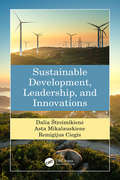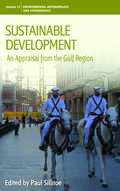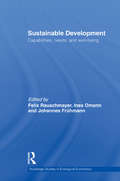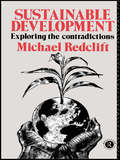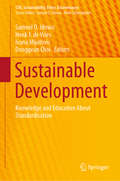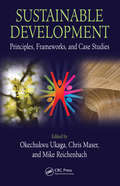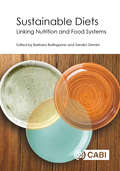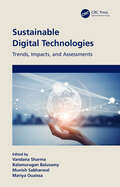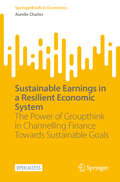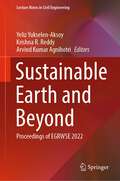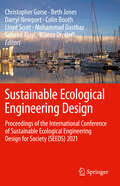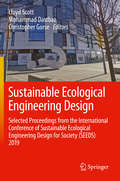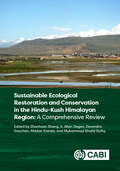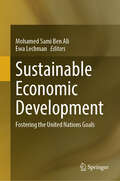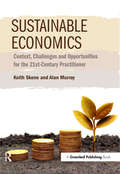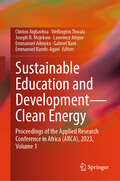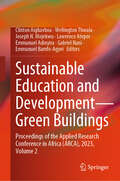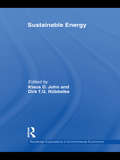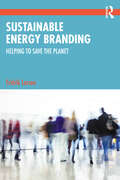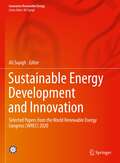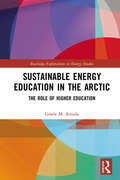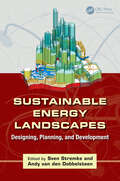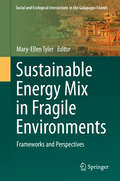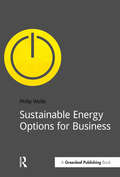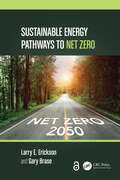- Table View
- List View
Sustainable Development, Leadership, and Innovations
by Dalia Streimikiene Asta Mikalauskiene Remigijus CiegisThis book deals with the main challenges of sustainable development and the role of sustainable business and corporate social responsibility in implementing these challenges through sustainable leadership and innovations. It includes the economic, social, and environmental dimensions of sustainability and emphasizes the importance of achieving a socio-environmental balance in society. The theoretical frameworks and insights from sustainable development implementations on macro and micro levels, as well as the practical examples and case studies provided to introduce the concept of sustainable leadership and its impact on sustainable business development, are a scientific novelty in the field of sustainability. The book is comprised of six interconnected chapters that sequentially reveal the principal provisions of sustainable development, corporate social responsibility, and sustainable leadership, together with their correlations. Features: • Provides cutting-edge examples and case studies of sustainable leadership, viewed as the most significant means for the creation of sustainable organizational culture • Includes case studies on the economic, social, and environmental dimensions of sustainability • Addresses scientific aspects of sustainable development and its challenges • Discusses issues of sustainable development at different scales, ranging from macro to mirco levels • Provides policy implications for sustainable business development The theoretical framework and practical case studies presented in Sustainable Development, Leadership, and Innovations make it an invaluable resource and guide to both the academic and business communities. Business leaders, policy makers, and other professionals, as well as academics and graduate students, will all benefit greatly from this text.
Sustainable Development: An Appraisal from the Gulf Region
by Paul SillitoeWith growing evidence of unsustainable use of the world's resources, such as hydrocarbon reserves, and related environmental pollution, as in alarming climate change predictions, sustainable development is arguably the prominent issue of the 21st century. This volume gives a wide ranging introduction focusing on the arid Gulf region, where the challenges of sustainable development are starkly evident. The Gulf relies on non-renewable oil and gas exports to supply the world's insatiable CO2 emitting energy demands, and has built unsustainable conurbations with water supplies dependent on energy hungry desalination plants and deep aquifers pumped beyond natural replenishment rates. Sustainable Development has an interdisciplinary focus, bringing together university faculty and government personnel from the Gulf, Europe, and North America -- including social and natural scientists, environmentalists and economists, architects and planners -- to discuss topics such as sustainable natural resource use and urbanization, industrial and technological development, economy and politics, history and geography.
Sustainable Development: Capabilities, Needs, and Well-being (Routledge Studies in Ecological Economics #9)
by Felix Rauschmayer Ines Omann Johannes FrühmannThis groundbreaking new work establishes links between sustainable development, needs, well-being, and the capabilities approach that is central to human development and the United Nations Development Programme. By challenging the role of people in sustainability policy, this collection’s argument refocuses sustainable development on needs and makes it easier for people to relate positively to its core values. This exciting new book incites a whole new way of looking at sustainable development. Even though the word ‘needs’ is central to the most popular definition of sustainable development, the concepts of needs and capabilities remain within the debate on human development, without going further into intergenerational justice or environmental protection. The discussion of needs reaches non-academics in a more direct way than talking about abstract thresholds, substitutability and other issues dear to academic debate on sustainability. This collection links the questions of intra- and intergenerational justice with issues of quality of life, life courses, and well-being. Dealing with needs entails dealing with deeper layers of consciousness, revealing emotions and questioning habits and values. In this way, the collection presents an opportunity for substantial social change as well as a challenge for research and policy-making. This thought-provoking collection asks its readers to reconsider the role of needs based on the philosophical arguments presented, to understand how sustainability can become a part of the capability approach, to better consider the dependency of life chances on birth contingencies, and to see the relationship between capabilities, needs, and well-being in a different light. The editors finish by clarifying the possibilities and challenges of a needs-based sustainability policy for policy makers, and explain the role of deeply held values. This book should be of interest to postgraduates and researchers in Environmental and Ecological Economics, as well as many other disciplines including Political Economics, Social Ecology, Human Ecology, Sustainability Science and Developmental Politics.
Sustainable Development: Exploring the Contradictions (Sustainable Development Set Ser.)
by Michael RedcliftArgues that environmental problems need to be looked at internationally, in terms of the global economic system, and that the degradation of the environment is not natural', but an historical process which is intrinsically linked and shaped by economic and political systems.
Sustainable Development: Knowledge and Education About Standardisation (CSR, Sustainability, Ethics & Governance)
by Samuel O. Idowu Henk J. de Vries Ivana Mijatovic Donggeun ChoiThis book examines education about standardization in the context of sustainable management. It shows the role of standardization education in the global economy, and in markets, industries and businesses. The book presents knowledge on standardization for sustainable management, describes measures that can be taken to stimulate it, and highlights strategies for teaching and disseminating the concept. Subsequently presenting a number of best practices and case studies, the book seeks to align theory and practice. For researchers, this is the first academic publication that interconnects the concepts of sustainability, standardization and education. For professionals in the area of sustainability it shows that standardization is an essential instrument for enhancing sustainability for which proper education is needed. For standardization professionals the book reveals the links to sustainability and it shows not only the importance of education about standardization but also how this can be organized, and finally, for universities, the book shows that standardization deserves to be included in the curriculum, and it provides guidance and best practice examples about how this can be done.
Sustainable Development: Principles, Frameworks, and Case Studies
by Chris Maser Okechukwu Ukaga Mike ReichenbachCoined in the 1970s, the term sustainable development and the ideas behind it have enjoyed varying amounts of popularity over the years. And while dire predictions abound, the full impacts of global warming are not known, nor can they be known. What we do know is that to be sustainable, all societies must adjust to new realities, which include chan
Sustainable Diets: Directions And Solutions For Policy, Research And Action
by Barbara Burlingame Sandro DerniniThis book takes a transdisciplinary approach and considers multisectoral actions, integrating health, agriculture and environmental issues to comprehensively explore the topic of sustainable diets. The team of international authors informs readers with arguments, challenges, perspectives, policies, actions and solutions on global topics that must be properly understood in order to be effectively addressed. They position issues of sustainable diets as central to the Earth's future. Presenting the latest findings, they: <P><P> - Explore the transition to sustainable diets within the context of sustainable food systems, addressing the right to food, and linking food security and nutrition to sustainability; <P><P> - Convey the urgency of coordinated action, and consider how to engage multiple sectors in dialogue and joint research to tackle the pressing problems that have taken us to the edge, and beyond, of the planet's limits to growth; <P><P> - Review tools, methods and indicators for assessing sustainable diets; <P><P> - Describe lessons learned from case studies on both traditional food systems and current dietary challenges. <P><P> As an affiliated project of the 10YFP Sustainable Food Systems Program, this book provides a way forward for achieving global and local targets, including the Sustainable Development Goals and the United Nations Decade of Action on Nutrition commitments. This resource is essential reading for scientists, practitioners and students in the fields of nutrition science, food science, environmental science, agricultural science, development studies, food studies, public health and food policy.
Sustainable Digital Technologies: Trends, Impacts, and Assessments
by Vandana Sharma, Balamurugan Balusamy, Munish Sabharwal, and Mariya OuaissaThis book is a reference on digital technology and its impact on sustainability, providing insight into sustainable practices globally. It focuses on the critical practices leading to sustainable initiatives among various organizations, IT infrastructure, communities, and government compliance. The book describes the green computing paradigms and the impact of a circular economy with a focus on sustainable practices in a post-pandemic world. Sustainable Digital Technologies: Trends, Impacts, and Assessments discusses the critical factors leading to sustainable initiatives in a global economy. It highlights the impact of digital technology and Industry 4.0 in today’s world. The book focuses on the role, responsibility, and the effect of the Internet of Things for digital sustainability and practices. It describes implementation strategies for green cloud computing and presents additional strategies for sustainable practices in a post-pandemic world. This publication is designed for use by technology development academicians, data scientists, industrial professionals, researchers, and students interested in uncovering the latest innovations in the field and the current research on problem-oriented processing techniques in sustainable and evolutionary computing applications with reduced energy channelization.
Sustainable Earnings in a Resilient Economic System: The Power of Groupthink in Channelling Finance Towards Sustainable Goals (SpringerBriefs in Economics)
by Aurelie CharlesIn a world where global finance must align with the green transition, this Open Access book challenges established economic thinking. It argues for a shift from individualism to group-focused economic theory and policy, revealing that historical financial accumulation stemmed from collective rather than individual actions. To combat detrimental herd behavior, the book advocates for methodological groupism in economic policies. This shift promises more resilient financial flows, ensuring widespread societal benefits and mitigating harm to the global ecosystem. Through data analysis of capital and labor earnings in the US, UK, France, and Italy, and the introduction of "sustainable earnings trends," the book provides actionable insights applicable from local to international levels, using the Sustainable Development Goals (SDGs) as a guiding framework. This makes the book a must-read for scholars, researchers, and students of environmental economics, sustainability, labor economics, finance, public policy, and governance, as well as policymakers seeking profound insights into the future of sustainable economics and finance.
Sustainable Earth and Beyond: Proceedings of EGRWSE 2022 (Lecture Notes in Civil Engineering #370)
by Krishna R. Reddy Arvind Kumar Agnihotri Yeliz Yukselen-AksoyThis book presents select proceedings of the Third International Conference on Environmental Geotechnology, Recycled Waste Materials and Sustainable Engineering (EGRWSE-2022). It covers state-of-the-art research on environmental geotechnology, sustainability, and use of recycled waste materials for civil infrastructure along with latest accomplishments, trends, concerns, innovations, practical challenges encountered, and the solutions adopted in this field. Given the contents, this book is useful for researchers, engineers, and professionals working in the areas of geoenvironmental engineering, waste management, and sustainable engineering and associated fields.
Sustainable Ecological Engineering Design: Proceedings of the International Conference of Sustainable Ecological Engineering Design for Society (SEEDS) 2021
by Beth Jones Mohammad Dastbaz Christopher Gorse Colin Booth Lloyd Scott Darryl Newport Saheed Ajayi Bianca DrotleffThe International Conference of Sustainable Ecological Engineering Design for Society (SEEDS) brings together global experts to focus on a sustainability agenda and the positive and detrimental changes that are taking place. Papers presented at the conference come from across a broad spectrum of the Sustainable Development Goals (SDGs) and bring forward practices to tackle the climate emergency and evaluate their impact. It addresses technical issues, measuring, monitoring, and assessing change, emphasizing the environment, infrastructure, and buildings, how they exist in relative isolation, and the possibilities for sustainable integration. The SEEDS Conference addresses the interdependence of people and the built and natural environments and recognizes the interdisciplinary and international themes necessary to assemble the knowledge required for positive change.
Sustainable Ecological Engineering Design: Selected Proceedings from the International Conference of Sustainable Ecological Engineering Design for Society (SEEDS) 2019
by Mohammad Dastbaz Christopher Gorse Lloyd ScottThrough research and proven practice, the aim of the International Conference of Sustainable Ecological Engineering Design for Society (SEEDS) is to foster ideas on how to reduce negative impacts on the environment while providing for the health and well-being of society. The professions and fields of research required to ensure buildings meet user demands and provide healthy enclosures are many and diverse. The SEEDS conference addresses the interdependence of people, the built and natural environments, and recognizes the interdisciplinary and international themes necessary to assemble the knowledge required for positive change.
Sustainable Ecological Restoration and Conservation in the Hindu Kush Himalayan Region: A Comprehensive Review
by Professor Zhanhuan Shang Professor Allan Degen Dr Devendra Gauchan Professor Madan Koirala Dr Muhammad Khalid RafiqThe years 2021 to 2030 have been designated as "The United Nations Decade on Ecosystem Restoration". Ecological restoration and biodiversity conservation efforts face unprecedented challenges, especially in developing countries and areas, such as the Hindu Kush-Himalayan (HKH) region. This huge HKH region, which includes areas in eight separate countries (Afghanistan, Pakistan, Nepal, India, China, Bangladesh, Myanmar and Bhutan), is a biodiversity hotspot with a vast array of ecosystems, landscapes, peoples and cultures. It is known as one of 'the pulses of the world'. However, the HKH is also the world's largest and poorest mountain region, where landscapes and environments have been severely damaged as a result of climate change and human activities. Coordinating conservation and restoration policies, sharing knowledge and funds, and maintaining livelihoods are major challenges and are in urgent need of improvement. This book details the past and current ecological problems in the HKH region, and the threats and challenges that ecosystems and local people face. It pays special attention to developments of transformative adaptations and presents examples of sustainable conservation and ecological restoration management practices. Three primary questions are addressed: (1) Do the existing conservation strategies of international organizations and government policies really protect ecosystems and solve biodiversity problems? (2) Can these management measures be one-time solutions? and (3) What is the strategic framework and scenario prognosis for the future based on the historical trajectory of ecological conservation and restoration in the region? This book is essential reading for ecologists and conservation biologists involved in large-scale ecological restoration projects, along with practitioners, graduate students, policy makers and international development workers.
Sustainable Economic Development: Fostering the United Nations Goals
by Ewa Lechman Mohamed Sami Ben AliThis book provides readers with a comprehensive understanding of the general framework of sustainable development paths in relation to where countries stand at present, by outlining the main challenges they face, and the potential pathways ahead to foster the Sustainable Development Goals (SDGs). In connecting different SDG’s, the collection of chapters teases out the multifarious relationships and influences on policy, balancing economic, social, and environmental dimensions for development, making qualitative distinctions between high-income and low-income countries in the SDGs context. In doing so, the book emphasizes that with the rapid upliftment from extreme poverty and subsistence, globally, growing economic and social gaps have expanded with unprecedented speed. Widening divides in material wealth are shown, to some extent, as a ‘side effect’ of fast economic growth and development. This book draws out these connections between economic progress (expressed through shifts on per capita income) and the achievements and setbacks, to meeting each of the SDGs, respectively. Beyond its place in social scientific discourse, relevant to scholars researching the various aspects of sustainable economic development, this book's findings also have important implications for policymakers, development specialists, and economists in both developed and developing countries.
Sustainable Economics: Context, Challenges and Opportunities for the 21st-Century Practitioner
by Alan Murray Keith SkeneThis book marks a milestone in Economics publishing. Sustainable Economics is *the* subject of the moment, as businesses across the globe face up to peak oil prices, climate instability, increasingly complex environmental legislation and the challenge of adapting to a new business landscape. Sustainable Economics: Context, Challenges and Opportunities for the 21st Century Practitioner debugs the language of sustainable development. It explores the strengths and weaknesses of the many and diverse schools of thought. The book enables the modern business student and practitioner to disentangle the complex, often convoluted debate relating to sustainability, and it provides the tools necessary to lead their organizations through the murky waters of current times and prepare for the challenges of the future. Eschewing the linear – take, make and waste – approach of current business and manufacturing thinking, this book revisits the ecological models underpinning recent economic sustainability theory, and re-examines the consequences of modern ecological thought upon business strategies relating to sustainability. A chapter is also dedicated to the "circular economy", already in common parlance at policy levels in the UK, and notably in China and other developing countries.Packed with the most recent research papers, Sustainable Economics is an essential resource for the 21st-century business practitioner and legislator.The book is supported with a large array of teaching and learning material, for both formal and informal use, ranging from role play to data analysis which are available on request with the purchase of this book.
Sustainable Education and Development—Clean Energy: Proceedings of the Applied Research Conference in Africa (ARCA), 2023, Volume 1
by Clinton Aigbavboa Wellington Thwala Joseph N. Mojekwu Lawrence Atepor Emmanuel Bamfo-Agyei Emmanuel Adinyira Gabriel NaniThis book is Volume 1 of the proceedings of 2023 Sustainable Education and Development Research Conference. This volume concentrates on papers in the area of clean energy. Despite considerable progress, more than 700 million people worldwide still lack access to electricity, and around 2.4 billion people continue to use harmful and polluting fuels for cooking. While efforts have been made to promote renewable energy and energy efficiency, they have not been fast enough to achieve Sustainable Development Goal 7. Adding to the challenge, the ongoing war in Ukraine has contributed to rising global energy prices and heightened energy insecurity in Europe. In response to the energy crisis, some European countries are planning to accelerate the transition to renewables and increase investments in clean energy and energy efficiency. However, others are considering a resurgence of coal, which poses a risk to the overall green transition. Between 2010 and 2020, the percentage of the global population with access to electricity increased from 83% to 91%, with 1.3 billion people gaining access. Nevertheless, this leaves approximately 733 million people still without electricity, and most of them reside in sub-Saharan Africa. Achieving universal access by 2030, the annual growth rate in access needs to accelerate from 0.5 percentage points to 0.9 percentage points, necessitating significant efforts in low-income, fragile, and conflict-affected countries. In 2020, 69% of the global population had access to clean cooking fuels and technologies. While more than half of those without access to clean cooking fuels live in Asia, the 20 countries with the lowest percentage of people having access to clean cooking were predominantly least developed countries in Africa. The share of renewable sources in total final energy consumption reached 17.7% globally in 2019, just slightly higher than the figure for 2015. The electricity sector leads in the adoption of renewables, accounting for 26.2% of total final energy consumption in 2019, while the heat and transport sectors have made limited progress. Global primary energy intensity, defined as global total energy supply per unit of GDP, improved from 5.6 megajoules per dollar (2017 purchasing power parity) in 2010 to 4.7 megajoules in 2019. However, the rate of improvement (1.6% per year on average since 2015) falls short of the 3.2% annual rate needed to reach Sustainable Development Goal 7.3. International financial flows to support clean and renewable energy in developing countries reached $10.9 billion in 2019, a 23.6% decrease from 2018. This decline occurred even before the onset of the COVID-19 pandemic. Over a longer five-year moving average, average annual commitments decreased for the first time since 2008, from $17.5 billion in 2014-18 to $16.6 billion in 2015-19. Although developing countries achieved a record of 245.7 watts per capita in installed renewable energy-generating capacity in 2020, small island developing States, least developed countries, and landlocked developing countries have lagged behind. It would take least developed countries and landlocked developing countries nearly 40 years and small island developing States almost 15 years to reach the same level of progress as the average developing country in 2020. The 2023 SEDRC conference, titled "Sustainable Development and Education," aims to redefine the understanding of research in the continent's development and the role of researchers. The conference focusses on applied research discussions and its dissemination. Researchers from research institutions, academicians, postgraduate students, politicians, and industry representatives will be the primary audience for the conference proceedings.
Sustainable Education and Development—Green Buildings: Proceedings of the Applied Research Conference in Africa (ARCA), 2023, Volume 2
by Clinton Aigbavboa Wellington Thwala Joseph N. Mojekwu Lawrence Atepor Emmanuel Bamfo-Agyei Emmanuel Adinyira Gabriel NaniThis book is Volume 2 of the proceedings of 2023 Sustainable Education and Development Research Conference. This volume concentrates on papers in the area of green buildings. Despite considerable progress, more than 700 million people worldwide still lack access to electricity, and around 2.4 billion people continue to use harmful and polluting fuels for cooking. While efforts have been made to promote renewable energy and energy efficiency, they have not been fast enough to achieve Sustainable Development Goal 7. Adding to the challenge, the ongoing war in Ukraine has contributed to rising global energy prices and heightened energy insecurity in Europe. In response to the energy crisis, some European countries are planning to accelerate the transition to renewables and increase investments in clean energy and energy efficiency. However, others are considering a resurgence of coal, which poses a risk to the overall green transition. Between 2010 and 2020, the percentage of the global population with access to electricity increased from 83% to 91%, with 1.3 billion people gaining access. Nevertheless, this leaves approximately 733 million people still without electricity, and most of them reside in sub-Saharan Africa. Achieving universal access by 2030, the annual growth rate in access needs to accelerate from 0.5 percentage points to 0.9 percentage points, necessitating significant efforts in low-income, fragile, and conflict-affected countries. In 2020, 69% of the global population had access to clean cooking fuels and technologies. While more than half of those without access to clean cooking fuels live in Asia, the 20 countries with the lowest percentage of people having access to clean cooking were predominantly least developed countries in Africa. The share of renewable sources in total final energy consumption reached 17.7% globally in 2019, just slightly higher than the figure for 2015. The electricity sector leads in the adoption of renewables, accounting for 26.2% of total final energy consumption in 2019, while the heat and transport sectors have made limited progress. Global primary energy intensity, defined as global total energy supply per unit of GDP, improved from 5.6 megajoules per dollar (2017 purchasing power parity) in 2010 to 4.7 megajoules in 2019. However, the rate of improvement (1.6% per year on average since 2015) falls short of the 3.2% annual rate needed to reach Sustainable Development Goal 7.3. International financial flows to support clean and renewable energy in developing countries reached $10.9 billion in 2019, a 23.6% decrease from 2018. This decline occurred even before the onset of the COVID-19 pandemic. Over a longer five-year moving average, average annual commitments decreased for the first time since 2008, from $17.5 billion in 2014-18 to $16.6 billion in 2015-19. Although developing countries achieved a record of 245.7 watts per capita in installed renewable energy-generating capacity in 2020, small island developing States, least developed countries, and landlocked developing countries have lagged behind. It would take least developed countries and landlocked developing countries nearly 40 years and small island developing States almost 15 years to reach the same level of progress as the average developing country in 2020. The 2023 SEDRC conference, titled "Sustainable Development and Education," aims to redefine the understanding of research in the continent's development and the role of researchers. The conference focusses on applied research discussions and its dissemination. Researchers from research institutions, academicians, postgraduate students, politicians, and industry representatives will be the primary audience for the conference proceedings.
Sustainable Energy
by Klaus D. JohnRising fuel prices during recent years and the threat of global warming have reinforced public and scientific interest in the issue of sustainable energy, with the term sustainability understood as having economic, environmental and social dimensions. Renewable energy is seen as an effective means to address several problems simultaneously, including climate change, exploitation of non-renewable resources, the high volatility of energy prices on the global markets, dependency on fuels from politically unstable countries (energy-insecurity) and the transfer of wealth to these countries. This book addresses these and related topics including the diffusion of renewable technologies. Policies to induce sustainable energy use and production are discussed by researchers from a range of different disciplines. The result is a use-oriented and multidisciplinary perspective concerning policies to support sustainable energy use and production, which will be of great use to researchers and academics alike.
Sustainable Energy Branding: Helping to Save the Planet
by Fridrik LarsenSustainable energy branding has become one of the hottest topics in business. As climate change and market liberalisation—the greatest environmental and economic challenges of our times—are prompting the world's power companies to transform on a scale never seen before, the eyes of the world are firmly upon them. By introducing new business models, as well as new ways of generating power, energy-sector giants are aiming to dramatically cut harmful emissions over the next few decades. Crucial to the success of this transition is the support of energy consumers and political decision-makers, and this challenge should not be underestimated. Power companies are, therefore, developing new marketing and communication strategies around renewable energy, sustainable growth, co-operation with customers and environmental protection. Fridrik Larsen, the world’s foremost expert on energy branding, looks at the role of branding and marketing in the energy transition through a series of interviews with senior energy-sector executives. These compelling insights from industry leaders make this book a must-read for marketing and C-suite executives at energy companies who are wanting to communicate sustainable and renewable energy solutions effectively to make a difference.
Sustainable Energy Development and Innovation: Selected Papers from the World Renewable Energy Congress (WREC) 2020 (Innovative Renewable Energy)
by Ali SayighThis book contains selected papers presented during the World Renewable Energy Congress (WREC) 2020 at the Instituto Superior Técnico in Lisbon. The WREC is dedicated to promoting renewable energy global development, and features top international experts, policy makers, scientists, engineers, technology developers, and business practitioners addressing the most current research and technological breakthroughs in sustainable energy development and innovation. The contributions address policy and renewable energy technologies and applications in all sectors—for heating and cooling, agricultural applications, water, desalination, industrial applications, and for the transport sectors.Presents cutting-edge research in green building and renewable energy from all over the world;Covers the most up-to-date research developments, government policies, business models, best practices, and innovations;Contains case studies and examples to enhance practical application of the technologies.
Sustainable Energy Education in the Arctic: The Role of Higher Education (Routledge Explorations in Energy Studies)
by Gisele M. ArrudaThis book examines the nature of the ‘energy curriculum’ in Arctic Higher Education and provides invaluable data and new models to assess levels of Sustainable Development Literacy. Drawing on course mapping conducted in Higher Education institutions across the Arctic, Arruda looks at the nature, structure, and design of the Arctic Higher Education curriculum in order to assess levels of Sustainable Development Literacy and considers the extent to which Arctic Higher Education courses align to UNESCO Education for Sustainable Development (ESD). Using data from four key case studies in Norway, Canada, and the US, and applying a framework drawn from different knowledge systems (Traditional Knowledge and Western educational system), she analyses the different educational approaches and pedagogies used and specifically considers how Higher Education in this region can contribute to the accomplishment of Sustainable Development and the Sustainable Development Goals. The book concludes by proposing new models to assess Higher Education adherence to ESD and outlines how a culturally inclusive curriculum can invite different groups of people to engage in a meaningful Sustainable Development debate, learning experience, and knowledge application. This innovative volume will be of great interest to multicultural students, scholars, and educators of Sustainable Development, climate change, energy, Arctic studies, and global Higher Education across the Arctic and non-Arctic nations.
Sustainable Energy Landscapes: Designing, Planning, and Development
by Sven Stremke Andy van den DobbelsteenIn the near future the appearance and spatial organization of urban and rural landscapes will be strongly influenced by the generation of renewable energy. One of the critical tasks will be the re-integration of these sustainable energy landscapes into the existing environment-which people value and want to preserve-in a socially fair, environmenta
Sustainable Energy Mix in Fragile Environments: Frameworks and Perspectives (Social and Ecological Interactions in the Galapagos Islands)
by Mary-Ellen TylerThe purpose of this book is to present a range of cases and comparison of the issues, insights and cases emerging from the Sustainable Energy Mix Summit in the Galapagos that offer a better understanding of energy mix in fragile environments from a variety of International locations and contexts including the Galapagos.
Sustainable Energy Options for Business (Doshorts Ser.)
by Philip WolfeThe major environmental impact of most businesses derives from energy usage. The upside of this is that using energy more responsibly improves profitability. A business’s cheapest unit of energy is also the one which is least damaging to the planet: the unit you don't use.There are many ways to make your organization's energy usage more sustainable. In Sustainable Energy Options for Business, Philip Wolfe outlines the best available options for (1) reducing energy use and (2) improving the sustainability of energy supply. After an introduction to regulatory drivers and management issues, Wolfe looks at energy opportunities in five key areas: 1. Saving on energy usage; 2. Finding more sustainable sources of energy; 3. Generating renewable electricity; 4. Producing renewable heat; 5. Indirect energy sustainability options.Also included: An "energy checklist" to help identify your best options and important quick wins, plus a handy reference list, signposted from annotations in the text.
Sustainable Energy Pathways to Net Zero
by Larry E. Erickson Gary BraseSustainable Energy Pathways to Net Zero addresses realistic pathways between now and 2050 to reach net zero: a steady state concentration of greenhouse gases in the atmosphere. It discusses solar and wind energy, hydrogen, energy storage, and electric vehicles, all of which are becoming an increasingly cost-efficient part of these pathways. Hydrogen, the price of electricity, the integration of different sources of electricity into the electrical grid, and the electric vehicle charging networks are crucial in balancing supply and demand. This book describes how these different energy factors fit together. It emphasizes the fact that the intersection of these technologies is where the most profound advances can occur.Features: Emphasizes the importance of demand management for electricity and reducing cost. Explains the economics of reaching net zero emissions and the role of innovation and public policies, among others. Discusses the cost and efficiency of solar and wind power, electric vehicles, and storage technologies, and describes the benefits of battery swapping. Focuses on the role of integration of different sources of electricity into the electrical grid as an important part of the pathway. Recommends research and development on electrochemical processes to remove carbon from the ocean. Written in a simple language for a general audience and understandable for a global market. Is Open Access to encourage global use. This book is a great resource for government and industry professionals involved in energy production and management, as well as academics and students in science and engineering interested in the pathways to sustainable development. The Open Access version of this book, available at http://www.taylorfrancis.com, has been made available under a Creative Commons Attribution-Non Commercial-No Derivatives (CC-BY-NC-ND) 4.0 license.
